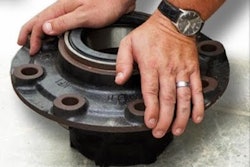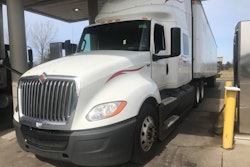
This article was updated May 18, 2021.
Some fleets are mistakenly under the impression that their ELDs are compliant with Canada’s upcoming third-party certification requirement according to Kerri Wirachowksy, director of the Roadside Inspection Program at the Commercial Vehicle Safety Alliance.
In fact, Wirachowsky explained, no carriers currently meet the new regulation which starting June 12 will require carriers to use ELDs that have been third-party certified by a Canada-approved certification body.
The Canadian Council of Motor Transport Administrators said in early May that its "jurisdictions plan to support the mandate through a period of progressive enforcement without penalties, including elevated education and awareness, until June 12, 2022."
Of the 600 or so ELDs listed on the U.S. Federal Motor Carrier Safety Administration’s website, Wirachowsky said none have been certified by FPInnovations, the only group approved by Canada to issue third party certifications. However, some fleets are under the impression their ELDs are ready for the transition.
“Right now there is not one certified ELD for Canada and I talk to carriers and they say, ‘Oh no, our ELD is good to go to Canada,’” Wirachowsky said. “No, it's not. It is today. It won't be after June 12th."
[Related: Canadian ELD mandate could test credibility of some devices listed in FMCSA registry]
FPInnovations spokesman Jan Michaelsen said compliance testing is underway, with "more than a handful [of ELDs] being tested." However, at the moment, no ELD has been certified for use in Canada.
"It is difficult for us to put a time frame on when any of them will be certified," Michaelsen said. "Our testing capacity is not an issue."
Once ELDs meet third-party certification requirements, they'll be posted on Transport Canada's website.
Given the lackluster interest in third party certification, Michaelsen said “a great majority of the ELD vendors will presumably not be looking to certify in Canada” and recommended that U.S. fleets and owner-operators contact their current ELD providers with the following questions:
1. Will you adapt/modify/program your ELD to be compliant with Canadian ELD and HOS rules? The adaptation is not a simple task and can take several months.
2. If so, what are their plans to get third party certification? Have they applied to FPInnovations for certification?
3. If so, have they signed a contract and submitted devices for testing?
[Related: What to know about Canadian ELD requirements]
Mike Ahart, vice-president of regulatory affairs at Omnitracs, also recommended contacting ELD providers and provided some talking points to help determine if an ELD provider is actually a safe bet for the Canadian market.
“Have a conversation about, ‘What roles are you playing in the Canadian ELD? In other words, what Canadian associations are you members of? How long have you been actively involved in the Canadian ELD? What education material have you published to your website and have you performed webinars for customers and clients to demonstrate your knowledge and level of understanding of the ELD? And finally, do you understand the process for certification and have you committed to the nearly $50,000 fee it's going to cost to certify a device?’”
Ahart said most ELD providers will offer software downloads to become ELD compliant in Canada. For carriers and owner-operators that wish to buy new ELDs with third party certification, Ahart said the current semiconductor shortage could pose a problem.
“What I would do is continue to encourage motor carriers to be exploring and determining what system they're going to use for a number of reasons,” Ahart said. “First, you don't train your entire staff and drivers overnight how to use this stuff.
“The other thing is that if there is a shortage of inventory [owed to the low chip supply], you better be getting it now because if enforcement comes into play at some point earlier, rather than later, and you don't have it, you're going to be in trouble.”











